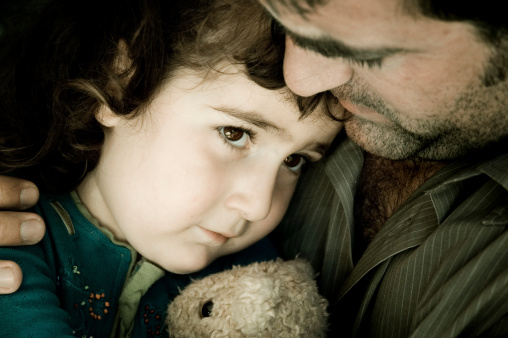
As a confirmed New Yorker subscriber, I enjoy the cartoons as much as the writing. Indeed, the cartoons alone would justify my subscription. Earlier this year, there was a drawing of a customer addressing a florist.
“I want some flowers that say, ‘Here! Have some frickin’ flowers!'”
For a lot of couples about to enter into a dissolution of their marriage, the holidays are a time of high anxiety. Often, both spouses know it’s coming–soon–but call a truce in order not to wreck the children’s Christmas.
According to some of my former clients who have done that, the whole holiday season felt like, “Here! Have a frickin’ truce!”
Tense, hollow, sarcastic. Anxiety-ridden, courtesy of the Unknown.
A close friend who knows about my practice once asked me, “What’s the most important thing you can tell someone who comes in to see you about a divorce?”
“Well, it will depend on what’s most important to that person at that moment, but, generally speaking, I’d want them to know it’s going to be all right,” I said.
“Isn’t that a little misleading? I mean, you don’t know anything about who they’re married to, or who that person’s lawyer is, or anything.”
“Well, I know this: when they talk to me, they’re living in a situation that’s become unbearable, a situation they know very well. And it’s bad enough that they’re talking to me about an Unknown–the divorce–that they’d rather deal with. I actually did once ask a client who was complaining about how long it was taking and how much it was costing whether he’d like to dismiss the action and stay married. He looked at me like I had two heads. ‘Not on the longest day you live,’ he said.”
So the goal was not an issue. By the way, that was before I began doing Collaborative cases. But my point is that the divorce itself will end some day, and probably in less than a year. And after it’s over, that person will go on with their life.
Most of the time, the people who come to me know that I do mostly Collaborative cases, where the couples have to agree on what happens before anything can happen, and where the goal is to agree on all the terms of the divorce. So they each have to give their spouse a reason to agree to what they’re seeking. More importantly, they have many opportunities over the weeks of that case to refine the conversation, discover what’s at the heart of their goals, and explore different ways of satisfying their spouse’s interests.
The upshot is that by the time they do reach all their agreements, they have talked everything through–usually multiple times–and they have a set of agreements they can live with. And things going forward are going to be all right! They can take some reassurance in that because their discussions were all based on their actual situation, not what they wish their situation was. They’ve spoken with their lawyers and they understand what the courts can do and what they won’t do.
In the Decree, under “real estate,” the court simply can’t award to the spouse who had an affair “the hottest corner of Hell.” For one thing, there’s no legal description. But if their husband or wife insists that this is the only appropriate residence for them, post-decree, I know that person will never succeed in a Collaborative case. I also know that person won’t “succeed” in court, either. And, finally, I know that person could care less if things turn out “all right,” because their highest priority is to give back the pain they feel to the person who, they believe, caused it. They almost certainly will get more help from a therapist than a lawyer.
But for the potential client who is most interested in ending their marriage, attending to their affairs, and starting a new life, history teaches us, time and again, that, really, it will be all right.
At least, that’s what my clients tell me.
 Divorce brings up many feelings, including feeling helpless. Sometimes you feel like your life is spinning out of your own control and you are left helpless. There is a quote by Aung San Suu Kyi that reads, “When you feel helpless, help someone.” So what does that mean? We have all experienced times in our life where we feel like the world is against and nothing is going right, divorce being one of them. The easiest way to get out of feeling this way: if you are feeling helpless, help someone. It helps us realize that we are all in this together, and we all have real life problems. In fact, it often helps us realize our problems are not nearly as big as someone else’s are. This is not to say that your problems are not important, but we are all fighting our own battles and you never know what the next person is battling.
Not sure where to start? Strapped for time and/or cash? Whether it’s finding a cause that you are passionate about and seeing where you can best share your time and talents, or simply random acts of kindness, no gesture is too small. See if there is a committee at church where you can lend a helping hand, register for a 5K which supports a cause that you care about, ask an elderly neighbor what they could use a hand with over the weekend, etc.
If you have children, of any age, but especially teenagers (good grief!), chances are they too are feeling like their lives are suddenly beyond their control, as they likely are. Help them find something they can control, because when you feel helpless, helping someone else is very empowering. Check into age appropriate volunteer opportunities at a local shelter to serve meals to the homeless, packing meals for children overseas, collecting coats and blankets and dropping them off for the homeless; the opportunities to help people are endless. Teaching your child that giving back to others will not only empower them in an otherwise helpless situation, but also helping others becomes a life lesson they will remember for years to come. As Ghandi stated, “Be the change you want to see in the world.” Start with yourself and then with your children.
Divorce brings up many feelings, including feeling helpless. Sometimes you feel like your life is spinning out of your own control and you are left helpless. There is a quote by Aung San Suu Kyi that reads, “When you feel helpless, help someone.” So what does that mean? We have all experienced times in our life where we feel like the world is against and nothing is going right, divorce being one of them. The easiest way to get out of feeling this way: if you are feeling helpless, help someone. It helps us realize that we are all in this together, and we all have real life problems. In fact, it often helps us realize our problems are not nearly as big as someone else’s are. This is not to say that your problems are not important, but we are all fighting our own battles and you never know what the next person is battling.
Not sure where to start? Strapped for time and/or cash? Whether it’s finding a cause that you are passionate about and seeing where you can best share your time and talents, or simply random acts of kindness, no gesture is too small. See if there is a committee at church where you can lend a helping hand, register for a 5K which supports a cause that you care about, ask an elderly neighbor what they could use a hand with over the weekend, etc.
If you have children, of any age, but especially teenagers (good grief!), chances are they too are feeling like their lives are suddenly beyond their control, as they likely are. Help them find something they can control, because when you feel helpless, helping someone else is very empowering. Check into age appropriate volunteer opportunities at a local shelter to serve meals to the homeless, packing meals for children overseas, collecting coats and blankets and dropping them off for the homeless; the opportunities to help people are endless. Teaching your child that giving back to others will not only empower them in an otherwise helpless situation, but also helping others becomes a life lesson they will remember for years to come. As Ghandi stated, “Be the change you want to see in the world.” Start with yourself and then with your children.  Divorce brings up many feelings, including feeling helpless. Sometimes you feel like your life is spinning out of your own control and you are left helpless. There is a quote by Aung San Suu Kyi that reads, “When you feel helpless, help someone.” So what does that mean? We have all experienced times in our life where we feel like the world is against and nothing is going right, divorce being one of them. The easiest way to get out of feeling this way: if you are feeling helpless, help someone. It helps us realize that we are all in this together, and we all have real life problems. In fact, it often helps us realize our problems are not nearly as big as someone else’s are. This is not to say that your problems are not important, but we are all fighting our own battles and you never know what the next person is battling.
Not sure where to start? Strapped for time and/or cash? Whether it’s finding a cause that you are passionate about and seeing where you can best share your time and talents, or simply random acts of kindness, no gesture is too small. See if there is a committee at church where you can lend a helping hand, register for a 5K which supports a cause that you care about, ask an elderly neighbor what they could use a hand with over the weekend, etc.
If you have children, of any age, but especially teenagers (good grief!), chances are they too are feeling like their lives are suddenly beyond their control, as they likely are. Help them find something they can control, because when you feel helpless, helping someone else is very empowering. Check into age appropriate volunteer opportunities at a local shelter to serve meals to the homeless, packing meals for children overseas, collecting coats and blankets and dropping them off for the homeless; the opportunities to help people are endless. Teaching your child that giving back to others will not only empower them in an otherwise helpless situation, but also helping others becomes a life lesson they will remember for years to come. As Ghandi stated, “Be the change you want to see in the world.” Start with yourself and then with your children.
Divorce brings up many feelings, including feeling helpless. Sometimes you feel like your life is spinning out of your own control and you are left helpless. There is a quote by Aung San Suu Kyi that reads, “When you feel helpless, help someone.” So what does that mean? We have all experienced times in our life where we feel like the world is against and nothing is going right, divorce being one of them. The easiest way to get out of feeling this way: if you are feeling helpless, help someone. It helps us realize that we are all in this together, and we all have real life problems. In fact, it often helps us realize our problems are not nearly as big as someone else’s are. This is not to say that your problems are not important, but we are all fighting our own battles and you never know what the next person is battling.
Not sure where to start? Strapped for time and/or cash? Whether it’s finding a cause that you are passionate about and seeing where you can best share your time and talents, or simply random acts of kindness, no gesture is too small. See if there is a committee at church where you can lend a helping hand, register for a 5K which supports a cause that you care about, ask an elderly neighbor what they could use a hand with over the weekend, etc.
If you have children, of any age, but especially teenagers (good grief!), chances are they too are feeling like their lives are suddenly beyond their control, as they likely are. Help them find something they can control, because when you feel helpless, helping someone else is very empowering. Check into age appropriate volunteer opportunities at a local shelter to serve meals to the homeless, packing meals for children overseas, collecting coats and blankets and dropping them off for the homeless; the opportunities to help people are endless. Teaching your child that giving back to others will not only empower them in an otherwise helpless situation, but also helping others becomes a life lesson they will remember for years to come. As Ghandi stated, “Be the change you want to see in the world.” Start with yourself and then with your children. 


 No one imagines they will find themselves single, divorced, and living in a 4 bedroom house in the suburbs alone, and then it happens. So what do you do when you wake up and realize that your life is not at all what you ever imagined it would be? How do you “cope” and “mourn” the loss of the life you had been planning for yourself?
First, remember you are not alone. You are never alone in this. Lean on your friends, family, and a good support group – whether it’s a support group you created with a network of friends and family, or a more formal divorce support group in your area. There are so many resource out there, find people/places/networks that you feel comfortable with. Seek out professional counseling or therapy, sometimes just talking about these hopes and dreams that could have/should have/would have been to a neutral party can be such a relief.
Know that it is ok to mourn this loss. For you it may be the loss of the “perfect family” you had envisioned – whether you never had kids and always wanted them, or had 1 or 2 and had wanted more. Maybe for someone else who is forced to go back to work because of the divorce, it may be the loss of being able to stay at home with the children. Perhaps it’s the loss of a certain lifestyle one may have gotten used to or thought they would attain someday, whether financially or within a certain social circle. Maybe divorce forced you to move to new area and you are mourning the loss of being close to your friends, in a certain school district for your children, or even simply mourning the loss of your home. It’s not irrational to mourn these things, whether they are lifestyles and material items you no longer have, or were simply hopes for the future – it is ok.
Take comfort in knowing that you never know what the future has in store for you. Maybe you always wanted kids and suddenly find yourself dating someone with children that you simply adore (young or old). Think you’re too old for that reality? Maybe you will remarry and have pile of grandchildren in your future. Maybe having to go back to work will one day lead to a promotion that allows you to take your children on trips of a lifetime and provide for their college education. There is a quote by Joseph Campbell that reads, “We must be willing to let go of the life we had planned, so as to have the life that is waiting for us.” Remember that.
No one imagines they will find themselves single, divorced, and living in a 4 bedroom house in the suburbs alone, and then it happens. So what do you do when you wake up and realize that your life is not at all what you ever imagined it would be? How do you “cope” and “mourn” the loss of the life you had been planning for yourself?
First, remember you are not alone. You are never alone in this. Lean on your friends, family, and a good support group – whether it’s a support group you created with a network of friends and family, or a more formal divorce support group in your area. There are so many resource out there, find people/places/networks that you feel comfortable with. Seek out professional counseling or therapy, sometimes just talking about these hopes and dreams that could have/should have/would have been to a neutral party can be such a relief.
Know that it is ok to mourn this loss. For you it may be the loss of the “perfect family” you had envisioned – whether you never had kids and always wanted them, or had 1 or 2 and had wanted more. Maybe for someone else who is forced to go back to work because of the divorce, it may be the loss of being able to stay at home with the children. Perhaps it’s the loss of a certain lifestyle one may have gotten used to or thought they would attain someday, whether financially or within a certain social circle. Maybe divorce forced you to move to new area and you are mourning the loss of being close to your friends, in a certain school district for your children, or even simply mourning the loss of your home. It’s not irrational to mourn these things, whether they are lifestyles and material items you no longer have, or were simply hopes for the future – it is ok.
Take comfort in knowing that you never know what the future has in store for you. Maybe you always wanted kids and suddenly find yourself dating someone with children that you simply adore (young or old). Think you’re too old for that reality? Maybe you will remarry and have pile of grandchildren in your future. Maybe having to go back to work will one day lead to a promotion that allows you to take your children on trips of a lifetime and provide for their college education. There is a quote by Joseph Campbell that reads, “We must be willing to let go of the life we had planned, so as to have the life that is waiting for us.” Remember that. 




